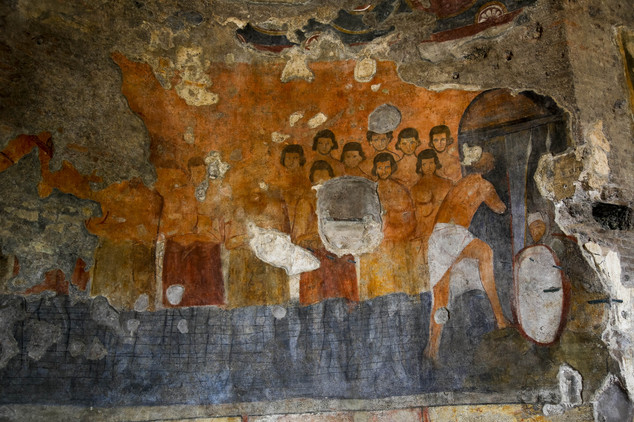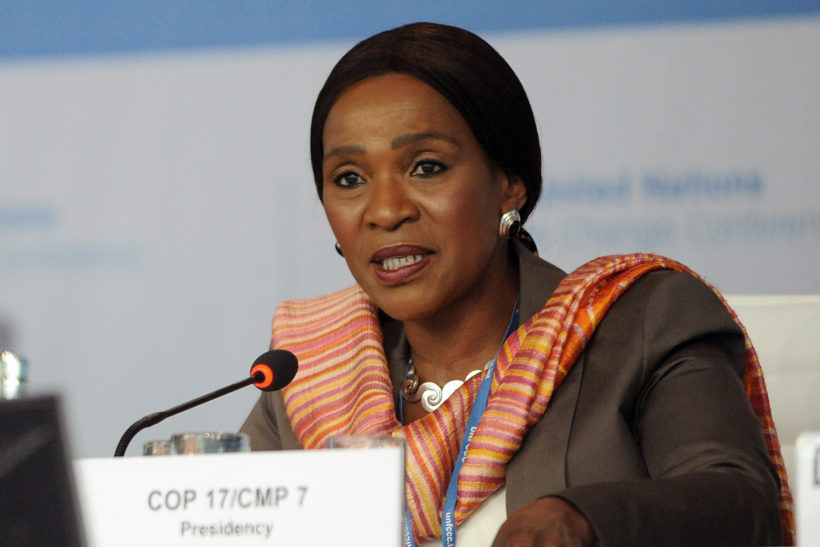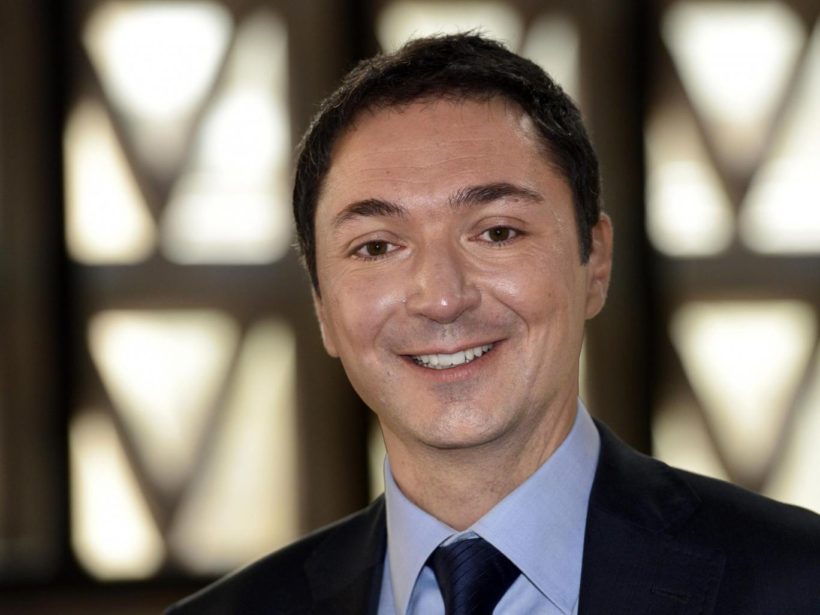News from Italy, South Africa and France
Tuesday's World Events — Posted on October 27, 2015
ITALY – Hidden passageway once used by Roman emperors opens to public for first time
A vast underground passageway that allowed Rome’s emperors to pass unseen from their hilltop palaces to the Roman Forum was opened to the public for the first time on Wednesday, October 21.
The 2,000-year-old “imperial ramp” descended from the top of the Palatine Hill, where successive emperors built lavish palaces [including the Imperial Palace], down to the temples, market places and courts of the Forum in the valley below, from where the Roman Empire was governed.
Lit by flickering torches and protected by imperial guards, the high-ceiling passageway was so vast that emperors could have comfortably passed through it on horseback.
Originally more than 300 yards long, it consisted of seven zigzag ramps, four of which remain today. The rest are believed to have been destroyed in an earthquake in the ninth century AD.
The covered walkway, which is enclosed and would have been invisible to the soldiers, slaves and plebeians going about their business in the Forum, was first discovered in 1900. The tunnel was partially excavated but then was then abandoned for another century, until archaeologists embarked on a major restoration project a few years ago. …
“For centuries, this was the entrance to the imperial palaces on top of the Palatine Hill,” said Francesco Prosperetti, the cultural heritage official in charge of the project.
Once tourists climb to its highest point, emerging from the arched passageway into the daylight, they have a panoramic view of the ruined temples, marble columns and ancient streets of the Roman Forum.
The entrance to the imperial ramp was a huge gateway which has been reconstructed using pieces of the original marble architrave.
The gate led to a reception hall which was converted into a church in the Middle Ages. The walls are still decorated with frescoes of “the 40 martyrs,” Roman soldiers from the XII Legion who converted to Christianity and were then made to stand in a lake, naked, on a bitterly cold night, until they froze to death.

Partial view of the restored frescoes adorning the Aula entrance to the Imperial Palace, a complex built by Emperor Domitian on the Palatine hill in the Roman Forum, in the 1st century A.D.
Halfway up the steep passageway archaeologists found the remains of a latrine, built from stone and marble, which would have been used by imperial guards.
Rooms that lead off the ramp – possibly used by detachments of guards – have been converted into a mini-museum of Roman artifacts found close to the passageway.
SOUTH AFRICA – South Africa likens draft climate deal to apartheid
BONN, Germany – South Africa on Monday (Oct. 19) criticized a draft United Nations accord on fighting climate change as a form of “apartheid” against developing nations.
A U.N. summit in Paris is supposed to agree to a global accord for trying to end climate change in December, but a last week of negotiations on the draft text, which began in Germany on Monday, got off to a stormy start with developing nations saying their demands had been omitted from the shortened 20-page draft.
“It is just like apartheid,” Nozipho Joyce Mxakato-Diseko, South Africa’s delegate who speaks on behalf of the main grouping of more than 130 developing nations and China, told the meeting.

Nozipho Joyce Mxakato-Diseko
“We find ourselves in a position where in essence we are disenfranchised,” she said, saying views of the poor had been ignored.
Developing countries said the draft, drawn up by two senior diplomats, favored rich nations and failed to stress that developed nations needed to take the lead in cutting greenhouse gas emissions and to provide far more aid and clean energy technology.
U.S. delegation leader Trigg Talley said the new text could work as a basis for talks. “This document has many things that most parties cannot agree with,” he said. Rich nations want to ensure that emerging economies will commit to act.
Christiana Figueres, the U.N.’s climate chief, expressed confidence the talks were on track for a deal at the Nov. 30-Dec. 11 summit in France, the goal of which is to cut greenhouse gas emissions they say causes global warming, which they believe causes more frequent and severe floods, droughts, heatwaves and rising sea levels. …
The developing nations won a demand on Monday (Oct. 19) that they could re-insert national demands into the text, raising fears by some that it could again become unwieldy. The previous version ran to 80 pages.
U.N. Secretary General Ban Ki-moon urged negotiators to drop what he says are narrow national interests. “There is no time to waste,” he told a news conference in Slovakia. “It has been quite frustrating to see negotiators negotiating only based on their very narrow national perspectives. This is not a national issue, it’s a global issue.”
FRANCE – France’s top weatherman suspended for writing book questioning climate change
Philippe Verdier, the popular chief weatherman at France Télévisions, the country’s state broadcaster, has been reportedly sent on a “forced vacation” for releasing a book accusing top climatologists of “taking the world hostage.”
Mr. Verdier, a household name for his nightly forecasts on France 2, has been taken off air after criticizing the world’s top climate change experts. He asserts in the book Climat Investigation (Climate Investigation) that leading climatologists and political leaders have “taken the world hostage” with misleading data.

French TV weatherman Philippe Verdier
In a promotional video, Mr. Verdier said: “We are hostage to a planetary scandal over climate change – a war machine whose aim is to keep us in fear.”
Expressing his opinion led France 2 to take him off the air starting Monday, Oct. 19. “I received a letter telling me not to come. I’m in shock,” he told RTL radio. “This is a direct extension of what I say in my book, namely that any contrary views must be eliminated.”
The book was released just before Paris is due to host a crucial UN climate change conference in December.
According to Mr. Verdier, top climate scientists, who often rely on state funding, have been “manipulated and politicized.”
He specifically challenges the work of the UN’s Intergovernmental Panel on Climate Change, or IPCC, saying they “blatantly erased” data that went against their overall conclusions; he also casts doubt on the accuracy of their climate models. (The IPCC has said that temperatures could rise by up to 4.8°C if no action is taken to reduce carbon emissions.)
Mr. Verdier writes: “We are undoubtedly on a plateau in terms of warming and the cyclical variability of the climate doesn’t allow us to envisage if the natural rhythm will tomorrow lead us towards a fall, a stagnation or a rise (in temperature).” …
(The news briefs above are from wire reports and staff reports posted at London’s Daily Telegraph on Oct. 20, Reuters on Oct. 19 and Daily Telegraph on Oct 14.)
Questions
1. For each of the 3 countries, give the following information:
- capital
- location/the countries that share its borders
- the religious breakdown of the population
- the type of government
- the chief of state (and head of government if different) If monarch or dictator, since what date has he/she ruled? – include name of heir apparent for monarch
- the population
Find the answers at the CIA World FactBook website.
For each country, answers can be found under the “Geography” “People” and “Government” headings.
NOTE: If WorldFactBook appears outdated for any country, go to Wikipedia – search there for “Religion in ___” or “Politics of ____” for the leaders. Or do an internet search for “Population of ___.”
NOTE to students: Before answering the questions below, read the information under “Background.”
2. For ITALY:
a) list the who, what, where and when of the news item
b) What was the Forum?
c) From “Background” below the questions: A new crowd-funding initiative, LoveItaly!, was launched to encourage fans around the world to contribute to the upkeep of the country's artistic treasures amid a decline in public spending for conservation projects. What do you think of the Italian government using this method to raise conservation funding?
3. For SOUTH AFRICA:
a) list the who, what, where and when of the news item
b) Who is Nozipho Joyce Mxakato-Diseko?
c) Why do these countries oppose the UN’s climate change ideas?
4. For FRANCE:
a) list the who, what, where and when of the news item
b) Upon being forced to go on vacation, Mr. Verdier said, ”This is a direct extension of what I say in my book, namely that any contrary views must be eliminated."
One theory on climate change is the earth’s climate is warming as a result of human actions and an extreme change in the earth’s climate will occur. Why do you think people who hold this belief wish to silence anyone who disagrees with them? (Ask a few friends and/or relatives why they think this is so.)
Background
ITALY
- The Palatine, a craggy hill that overlooks central Rome, was first settled 800 years before Christ.
- Successive emperors built huge palaces on top of it until the entire area became one interconnected imperial complex.
- The covered ramp was commissioned by the Emperor Domitian in the late first century AD at the height of his reign.
- He constructed a vast new palace on the Palatine, which is the origin of the words “palazzo” and “palace”
- The sumptuousness of the complex did the emperor little good in the end – he became paranoid and reclusive and was assassinated by courtiers inside the palace in AD 96, at the age of 44. (from the Telegraph article above)
- Forum Superintendent Francesco Prosperetti said the ramp links two very different areas: The public areas of the Forum, where day-to-day business and public administration was conducted and the more private residential area up on the hill.
- "Today we can give back to the public an unknown portion of the Imperial Palace," said archaeologist Patrizia Fortini.
- The ramp boasts seven levels connected by six hairpin turns, some underground and some above ground. It empties onto a hilltop terrace offering stunning views of the Forum, Rome beyond.
- The ramp was opened to the public on the same day the public was invited to help fund other restorations of Italy's cultural heritage. A new crowd-funding initiative, LoveItaly!, was launched to encourage fans around the world to contribute to the upkeep of the country's artistic treasures amid a decline in public spending for conservation projects.
- The first restorations funded by Loveitaly! include a room in the Domus of the Centaur in Pompeii and a sarcophagus at the National Gallery for Ancient Art. (from CBSNews)
SOUTH AFRICA - From a commentary posted at StudentNewsDaily in September 2013 (read the entire article here):
- The Intergovernmental Panel on Climate Change (IPCC) was established in 1988 by the United Nations. Over the last 25 years, the IPCC became the “gold standard” of climate science, quoted by all the governments of the world.
- IPCC conclusions are the basis for climate policies imposed by national, provincial, state, and local authorities.
- Cap-and-trade markets, carbon taxes, ethanol and biodiesel fuel mandates, renewable energy mandates, electric car subsidies, the banning of incandescent light bulbs, and many other governmental policies are the result.
- In 2007, the Global Warming Petition Project published a list of more than 31,000 scientists, including more than 9,000 PhDs, who stated, “There is no convincing scientific evidence that human release of carbon dioxide, methane, or other greenhouse gases is causing or will, in the foreseeable future, cause catastrophic heating of the Earth’s atmosphere and disruption of the Earth’s climate.”
Read more about the IPCC from a previous StudentNewsDaily article.
FRANCE - TV Weatherman suspended for expressing his opinion:
- Asked whether he had permission from his employer France 2 to release the book, he said: “I don’t think management liked it, let’s be honest. I put myself via this investigation on the path of COP 21 (the UN climate meeting in December), which is a bulldozer, and we can see the results."
- Mr. Verdier told France 5: “Making these revelations in the book, which I absolutely have the right to do, can pose problems for my employer given that the government (which funds France 2) is organizing COP [the climate change conference]. In fact as soon as you a slightly different discourse on this subject, you are branded a climate sceptic.”
- He said he decided to write the book in June 2014 when Laurent Fabius, the French foreign minister (equal to U.S. Secretary of State), summoned the country’s main weather presenters and urged them to mention “climate chaos” in their forecasts.
- “I was horrified by this discourse,” Mr. Verdier said. Eight days later, Mr. Fabius appeared on the front cover of a magazine posing as a weatherman above the headline: “500 days to save the planet.”
- Mr. Verdier said: “If a minister decides he is Mr. Weatherman, then Mr. Weatherman can also express himself on the subject in a lucid [clear] manner.
- “What’s shameful is this pressure placed on us to say that if we don’t hurry, it’ll be the apocalypse,” he added, saying that “climate diplomacy” means leaders are seeking to force changes to suit their own political timetables.
- According to L’Express magazine, unions at France Television called for Mr. Verdier to be fired, but that Delphine Ernotte, the broadcaster’s chief executive, initially said he should be allowed to stay “in the name of freedom of expression.” (from the Telegraph article above)
The opposing viewspoints on global warming are:
- The earth’s climate is warming as a result of human actions; an extreme change in the earth’s climate is going to occur, caused by greenhouse gas emitted by the world’s use of fossile fuels (coal, oil, gas). This temperature change will result in catastrophic problems in the environment. Humans must drastically reduce the consumption of fossile fuels immediately. To prevent this man-made climate change, countries need to restrict energy use (reduce use of gas and oil).
Liberals generally hold this view. Check out two liberal organizations which defend this viewpoint:
Natural Resources Defense Council and Greenpeace. - Human activity does not affect the earth’s temperature. Burning fossil fuels (gas, coal and oil) does not cause climate change. The earth’s climate changes naturally, but not so much that it will cause a change of catastrophic proportions. An extreme change in the earth’s climate will not happen. There are natural warming and cooling trends over time. In the 1970′s a coming ice age was predicted, but now that scare has been replaced with the current global warming scare.
Conservatives generally hold this view. Two conservative organizations which support this view are:
FriendsOfScience.org and Junk Science. - NOTE: The UN climate conference (of Dec. 2007) met in Bali to discuss global warming met strong opposition from a team of over 100 prominent international scientists, who warned the UN that attempting to control the Earth’s climate was “ultimately futile.” The scientists, many of whom are current and former UN IPCC (Intergovernmental Panel on Climate Change) scientists, released an open letter (Dec. 13, 2007) to the UN Secretary-General questioning the scientific basis for climate fears and the UN’s so-called “solutions.”
Read the complete letter at: ScienceandPublicPolicy.org.
